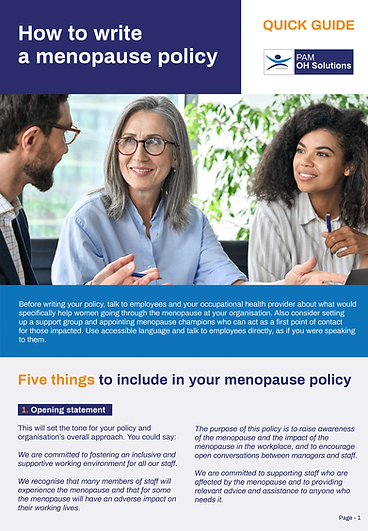
World Menopause Day: Five ways to support employees
With HRT in the spotlight this year, it’s important to remember that menopause isn’t a disorder to be treated, rather a transition to be supported.
The theme for this year’s World Menopause Day (18 October) is hormone replacement therapy (HRT). However, in discussing the benefits of a medication for helping some women to reduce symptoms, it’s important to remember menopause isn’t a disorder to be treated.
Instead, menopause is best viewed as a transition that women need to be supported through. Typically, at a time when they are going through other transitions, such as seeing children into adulthood, taking on new responsibilities at work or caring for elders.
This is as much about supporting women to reduce fatigue, by avoiding ‘boom and bust’ working practices, as it is about signposting to relevant healthcare options. Our clinical team share their top five tips for providing holistic, joined-up support this world menopause day.
Five ways to support women through the menopause
1. Take a holistic approach
Once women understand they’re struggling with menopause, many will mistakenly assume that HRT is a magic bullet that will cure their symptoms. For some it may be greatly beneficial, in which case it’s important for them to know that they can now access cheaper HRT prescriptions through a prescription prepayment services (PPC).
However, not only can many women not take HRT, due to hereditary cancer risks and other conditions, but it doesn’t work for everyone. Furthermore, although poster girls for HRT, such as Davina McColl, have praised the benefits of HRT, they have also benefited greatly from making key lifestyle changes. These include exercising more, eating more healthily and reducing alcohol consumption, all of which are critical to managing menopause.
Employers must therefore be careful to avoid presenting HRT as a magic bullet for ‘curing’ menopause. Or giving women the idea that menopause is something they should be able to quickly ‘recover’ from. Instead, HRT must be presented as just one of a number of possible options that can help women manage the huge physical and emotional transitions in their life.
2. Support positive lifestyle changes
Exercise can help to improve sleep patterns, maintain a healthy weight and boost heart health, all of which can also become negatively impacted by menopause. However, it can be difficult for women with child and eldercare responsibilities to fit in exercise outside of work, so encouraging them to attend a lunchtime or late morning session can be hugely beneficial.
Managers should also encourage employees to take regular fresh air or movement breaks and women going through the menopause to avoid ‘boom and bust’ working patterns. While they might have been able to cope with this before, better pacing themselves and knowing when to say no is essential to managing menopause symptoms such as fatigue and brain fog.
It can also be helpful to provide workshops and webinars on managing menopause symptoms. For example, ways of tackling feelings of reduced self-esteem, eating for energy and avoiding triggers for night sweats, such as alcohol, caffeine and smoking.
3. Put in place reasonable adjustments
For the two thirds of women who say menopause symptoms have had a negative impact on them at work, it’s important for employers to consider reasonable adjustments. These can range from a reduction in workload to reduce mental health issues such as anxiety to encouraging use of memory aids to mitigate brain fog.
Something as simple as allowing someone experiencing problems sleeping to work more flexibly or start work a bit later can also make a huge difference to their ability to stay in work. As can allowing someone experiencing hot flushes to use a desk fan or wear a cotton uniform to keep these manageable.
An occupational health provider can work with both the manager and employee to understand how the individual’s symptoms are affecting them at work. Then suggest reasonable adjustments that work for both the business and employee. The idea is that it’s far better to keep someone in work at 80% of their usual capacity for a time than lose them altogether.
4. Carry out pre-emptive workforce planning
Half the population will go through menopause, so as the workforce ages, it’s becoming increasingly important to anticipate the impact of menopause on the workforce. Otherwise, if everyone in a mostly female department goes through menopause at the same time, it could become unreasonable to allow all of them to work in a reduced capacity.
Critical to avoiding this is carrying out workforce planning to pre-empt which other departments could take people on a reduced capacity for a time and putting in place measures to bring women off reasonable adjustments once they’ve gone through menopause or symptoms improve.
At the same time, this workforce planning could look at the potential impact of other prevalent conditions, such as cancer or depression, and the effectiveness of the wellbeing plans in place for supporting everyone affected by a health condition to stay in work. Not least because most people want to remain productive and in work if supported to do this.
5. Help women understand what’s happening to them
We also see a lot of women incorrectly referred into our occupational health services for mental health issues, when they’re actually approaching menopause. Although we’re able to rapidly provide them with the support needed to remain in work, one in ten women without this support have to attend 6-10 appointments to get a diagnosis from their GP.
This means the more you can do to educate women about the symptoms and timing of menopause the better. Download our free guide to writing a menopause policy for a full list of symptoms and other things you can do to support women through the menopause.

How can PAM Group help?
We can help you to support employees through menopause in the following ways:
PAM OH Solutions – timely access to occupational health professionals who can support the employee to better manage symptoms and identify any reasonable adjustments that could be put in place to prevent them from going off sick or feeling like they have to quit their job.
Workshops & Webinars- training for employees on the symptoms of menopause and how best to manage or reduce symptoms with lifestyle changes or treatment options. With separate workshops for managers on how best to support employees affected by menopause.
Workforce Planning- consultancy service to understand the likely impact of various health conditions on the ability of employees to attend and perform at work. Plus insight on proactive steps that can be taken to mitigate this and support people to stay in work.
PAM Wellness (EAP)- Round-the-clock access to clinical and professional advisors, who can provide counselling and support with health, childcare, eldercare and other relationship and financial or debt issues. Including employee wellbeing app.
Physio Information Line (PhIL)- Helpline staffed by experienced physiotherapists, who can provide advice and exercises for musculoskeletal (MSK) issues related to menopause. Including advice on how to stay more active to strengthen bones and muscles.
If you would like to discuss the opportunities for reducing sickness absence across your organisation, please contact us to set up a free consultion via info@pamgroup.co.uk
Related Insights
Flu season is coming early – is your workplace ready?
How to respond to the rise in employee drug and alcohol use
Reducing work-related illness with health surveillance
Occupational health insights on keeping your people healthy and productive
Want to have our latest research, case studies and opinions
delivered straight to your inbox?





